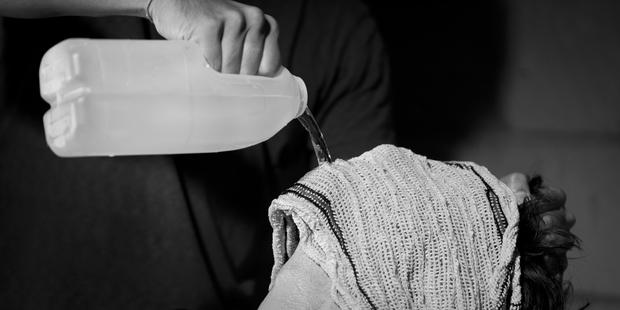It’s clear to us that the torture memos released yesterday, as gruesome and repugnant the details are within, are only the tip of the iceberg.
As far as we currently know, the interrogation regime spelled out in the Bybee memo is the best case scenario for how detainees were treated. Amnesty International has been interviewing the victims of torture for almost fifty years and our experience teaches us that abuse nearly always escalates over time. It starts with roughing people up at 3am and ends with naked people piled up in pyramids.
All that we know is based on leaked reports, on a handful of interviews, and some pictures no one wanted us to see. What about the hundreds of other detainees, civilian and military staff who worked at these torture facilities? What other files and images exist? Why would the CIA destroy mountains of tapes and who knows what else?
Because as awful as the images from Abu Ghraib, as vile as the techniques outlined in the torture memos, there is so much more that we still do not know.
That’s why we were relieved that at least President Obama made good on his promise for a more transparent government by releasing the memos. This is an important distinction from other nations who practice torture. If what Bush and Cheney did was immeasurably damage our nation’s system of values and credibility, Obama took the first, critical step to repairing that damage by releasing the memos.
But we will not know the truth of what has been done in our name until a thorough, independent investigation has been conducted. It is clear from the Attorney General’s comments that the government cannot be trusted to do this alone. We’ve done plenty of reflecting, and it’s now time to act like a true democracy, built on the rule of law. Laws mean nothing if they are not enforced.
Go to any prison or jail in the United States, and you will find countless unsympathetic criminals: rapists, murderers, even domestic terrorists. Imagine telling an American police officer to treat these criminals in the manner outlined by the torture memos. What would they do? Would they blindly follow the command to do what they knew was wrong, both morally but also legally? The vast majority would not. Our agents in Iraq, Afghanistan and the other black sites knew better too.
The CIA officers in the field knew what they wanted to do was wrong which is precisely why they sought legal cover from the Office of Legal Council. They lawyered up. Jay Bybee, John Yoo and Steven Bradbury knew they were ignoring decades of jurisprudence in drafting their memos. This is not a good faith misunderstanding, this was a coldblooded decision to torture prisoners in American custody.
Laws have been broken and fundamental human rights have been abused. We have a responsibility to ourselves, to our nation and to the international community to show that this was wrong and that such a deviation from the values on which America was built shall not go unpunished.
Tell Congress to setup an independent investigation.





